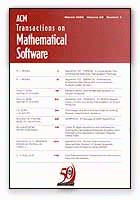|
Editorial Charter The purpose of the ACM Transactions on Mathematical Software (TOMS) is to communicate important research results addressing the development, evaluation and use of mathematical software. In addition, TOMS publishes machine-readable computer software which is incorporated into the Collected Algorithms of the ACM; such software may be written in any programming language that is in widespread use, but the author must be able to make the case as to why the language chosen was the most appropriate given the goals of wide usability and applicability of research published in TOMS. In both research papers and software, TOMS seeks contributions of lasting value in which technical quality, relevance to significant computations, interest, and novelty are all high, and where presentation is effective. |
This scope of TOMS involves a number of dimensions, each of which overlap TOMS to some degree:
Methodology
Design, development and implementation of algorithms; design of user and system interfaces; analysis, testing and evaluation of algorithms and computer programs; documentation, dissemination, and maintenance of computer programs.
Environment
Machine arithmetic; parallel and vector processing; error handling; languages; software tools.
Paradigms
Numeric computation; symbolic computation; computational science; problem solving environments; knowledge-based approaches; object-oriented computing.
Applications
Mathematical function evaluation; linear algebra; nonlinear equations; interpolation and approximation; data handling; transforms; statistical analysis; quadrature; differential and integral equations; optimization; computational geometry; discrete and symbolic mathematical algorithms; pattern recognition; sorting, searching, and classifying.
None of these topics completely overlaps the scope of TOMS, however. To be considered for TOMS, manuscripts must address such topics in the context of the production, evaluation and use of well-engineered mathematical software which supports significant computer applications. Purely theoretical papers from traditional areas (e.g., numerical analysis or software engineering) that are not presented in the context of mathematical software are rarely acceptable. At the other extreme, papers that are essentially user manuals or tutorials for a computer program are also normally unacceptable as also are papers which entirely application/subject specific.
In general, TOMS manuscripts are expected to contain (a) motivation for the problem considered, (b) an indication of the relationship of the work to the current state-of-the-art, (c) a technical analysis of the proposed solution, (d) evidence of effectiveness and practicality, and (e) evidence of superiority compared to the best alternative approaches.
In many cases, effectiveness can be demonstrated through careful analysis. However, data obtained from well designed experiments may be needed to justify claims of practical superiority. For papers whose principal contribution is the implementation of novel computational methods, an extensive experimental evaluation of computer implementations, including comparisons with the best available software for the problem, is typically required. For a paper whose principal contribution is in software or interface design, evidence of its superiority may include empirical data demonstrating an improvement in readability, usability or robustness. Examples could include simplification and reduction of function parameters, reduction of code size, capability of handling more general situations, improved error handling, and the use of objects or constructs that are naturally suited for the application area. Such assertions should be supported by quantitative evidence whenever possible.
Survey papers are acceptable, provided they have a fairly narrow focus, summarize and organize recent research in a way that is itself novel, and contribute to the advancement of research in the field. Authors intending to submit such papers are encouraged to discuss their ideas with the Editor-in-Chief first.
Potential authors should consult the Information for Authors and the ACM Algorithms Policy. Both authors and readers are encouraged to peruse the TOMS World Wide Web (WWW) pages for related information, including lists of past and future articles and links to published algorithms. These pages can also be reached through the ACM WWW pages at http://www.acm.org/ or directly at http://www.acm.org/toms/.
January 1995
Last update: Ian Gladwell, April 2007
